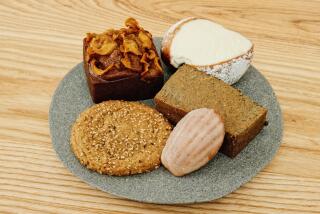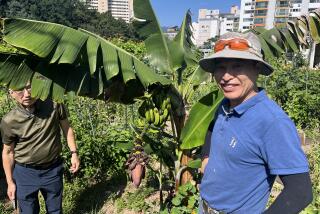Trade Spat Ferments Over Spicy Cabbage
- Share via
QINGDAO, China — Only two years ago, Jo Sung-gu was riding the kimchi craze.
The stocky manager of a kimchi factory here could barely keep up with orders for Korea’s fiery national dish. The blood-red cabbage was being touted as a preventive agent against SARS and other ailments. Instead of fruit and wine, Jo took boxes of kimchi to people’s homes.
But these days, the 50-year-old South Korean thinks twice about giving kimchi as a gift. His factory shut down for two weeks this month, and he has laid off workers. Now, Chinese authorities are holding back exports, and across the Yellow Sea, kimchi is being quarantined at ports in South Korea, his largest market.
“There’s not much I can do. I have to wait,” says Jo, whose company, Qingdao Xinwei Food, is among about 120 Korean and Chinese kimchi producers in this coastal region in Shandong province.
A trade spat over the spicy cabbage is straining relations between China and South Korea.
Kimchi sales have fallen sharply in Asia after officials in Seoul last month banned Chinese-made kimchi, saying some samples contained eggs of parasitic worms. Beijing retaliated by prohibiting imports of kimchi and several other foods from South Korea, saying they too contained parasite eggs.
Although analysts say most of the bacteria found aren’t harmful to humans, the ruckus has smeared the good name of kimchi -- a $830-million industry in South Korea alone -- and put a spotlight on food safety at a time when consumers are nervous about avian flu and other food-borne diseases.
Producers in China say the pickle controversy boils down to base protectionism. They claim that South Korean politicians and others beholden to their kimchi farmers stirred up the issue to stop the booming growth of Chinese-made kimchi, especially shipments to Korea.
Kimchi is to Koreans what pasta is to Italians. The 3-millennium-old dish, of which there are about 200 varieties, is served with nearly every Korean meal. South Koreans have protected the kimchi heritage with as much zest as the juices that ferment inside clay kimchi jars.
Before the latest drop-off, exports of Chinese-made kimchi to South Korea were on pace to reach nearly $50 million this year, about 6% of the South Korean market. Chinese kimchi has also been cutting into South Korea’s exports to Japan.
The South Koreans “are looking for any reason to crush Chinese kimchi,” said Wang Lin, a senior manager at Qingdao Meiying Food Co., which has seen its kimchi exports to Japan drop by 12%. Wang said Koreans complained two months ago that the Chinese kimchi was contaminated with lead.
“What will they gin up next?” he asked, pushing aside a small container of kimchi on the conference table at his company here.
A spokeswoman for Chongga Kimchi, one of the world’s largest kimchi makers based in Seoul, says the row over kimchi has gotten out of hand. But there’s a silver lining, Lee Hye-jin said: It will winnow out substandard brands.
At Jo Sung-gu’s factory, the pungent smell of red pepper, garlic and onion wafted through the low-slung building. Employees passed through an air-spray disinfectant before entering the workroom.
Vats brimmed with Chinese cabbage. “We soak them for 15 hours,” Jo said.
He walked farther down the production line where white-capped workers tore the outer leaves of cabbage heads. They then rinsed them six or seven times with the same Laoshan Mountain spring water that is used by the famous hometown brewer Tsingtao Beer.
“How can our kimchi not be safe?” Jo asked.
The South Korean-born Jo and dozens of other Koreans and Chinese have opened kimchi plants here in the last few years, taking advantage of China’s cheap labor and vegetables. But now, they are fighting for their survival.
Analysts are not surprised at the quarrel over kimchi. China’s handling and inspection of food have left much to be desired, they say.
Among other things, local health officials have ordered kimchi cabbage growers to use chemical fertilizers instead of human waste or animal manure, which South Korean food inspectors suspect may have contaminated China-made kimchi.
“We should use this opportunity to apply some effective measures to improve safety of Chinese farm goods,” said Tian Weiming, professor of economics at China Agricultural University in Beijing.
Qingdao Meiying is weathering the storm better than most rivals because half of its kimchi is sold in China and the other half in Japan. Other companies, such as Qingtao New Redstar Food, however, have been closed for a month because they serve mainly South Koreans customers. A few kimchi makers are said to be teetering on bankruptcy.
Makers of kimchi, or paocai in Chinese, have clustered around Qingdao in Shandong province, largely because this region is rich in vegetables and redolent of apples and fruits from its many orchards. It is also close to ports in South Korea and Japan.
Wang, the 40-year-old Meiying manager, had his first taste of kimchi when he was a boy growing up here. He remembered buying a bag of the pickled cabbage from a Korean street vendor who sold it for a nickel and threw in a fistful of peanuts for free.
Some three decades later, Wang and six of his partners added kimchi to their red-bean and vegetable exports to Japan, where many consider kimchi a health food and buy it in small jars.
Wang scoffed at the suggestion that his company’s kimchi could be contaminated. He said his Japanese buyers required that even the lid on jars be sealed tight enough to lock in the juices but not too firm that it could not be easily opened.
This is not the first time South Korea has sparred with a neighbor over kimchi.
In 2000, Seoul fought Japanese attempts to have the International Olympic Committee designate the Japanese style of kimchi, called kimuchi, an official Olympic food. In the end, South Korea’s recipe for kimchi was officially recognized as the standard by an international vegetable committee.
In recent years, South Korea has been trying hard to promote kimchi as a global food. A major media company in Seoul sponsored an international kimchi expo this month to celebrate the cultural value and health benefits of the “nation’s representative brand,” as the Kimchi Museum in Seoul calls the traditional food. Last year, South Korea exported about $102 million worth of kimchi worldwide, including $2 million worth to the United States.
In Southern California, home to the largest Korean population outside Asia, mom-and-pop businesses make kimchi from high-quality Napa cabbages, delivering gallon-size glass bottles to customers’ doors.
Like many commodities, Korean kimchi may have been destined to face challenges from China. About three years ago, South Korean kimchi makers first went to China to supplement their production in the busy late-summer season. But they found the prices irresistible. Wages in China are a tenth of South Korea’s and cabbage is two-thirds cheaper. Jo, of Qingdao Xinwei, says Chinese kimchi is produced for half the cost of South Korea’s.
Koreans already have forfeited production of handbags, clothes and accessories to China. But kimchi was considered off-limits.
Over the years, various Korean groups have claimed that kimchi, which is made also with ginger, radish, thick green onions and some fruits, cuts cholesterol and prevents cancer and diabetes. Kimchi lore also holds that the pickle helps people stay young and keeps their skin healthy.
But these days, even in Korea, many families wonder whether eating kimchi may be risky. Because of the bad publicity over tainted kimchi (samples of Korean-made kimchi tested by Seoul were also reported to have parasite eggs), some South Koreans are eating less of it. Others are making their own.
Before opening his factory in 2002, about an hour’s drive from downtown Qingdao, Jo spent a year traveling the region and visiting farmlands for the best ingredients. He made one sample after another, sent them to be taste-tested in South Korea and then hired a team to handle the production.
One of his top managers, Lan Shuxiang, who is from the area, said she could not stand the powerful odor at the beginning. Her nose burned and her stomach churned. It did not improve when the 43-year-old mother of two went home. Her family constantly teased her that she smelled like a “spicy walking cabbage.”
After two months, she got used to it. Now, the ruddy-faced woman can’t get enough kimchi. She eats it during lunch and dinner. Lan says she has no qualms about its safety. Nor does her family.
“If there isn’t kimchi on the table, we all miss it,” she says.
*
Cao Jun in The Times’ Shanghai Bureau contributed to this report.
More to Read
Sign up for Essential California
The most important California stories and recommendations in your inbox every morning.
You may occasionally receive promotional content from the Los Angeles Times.














